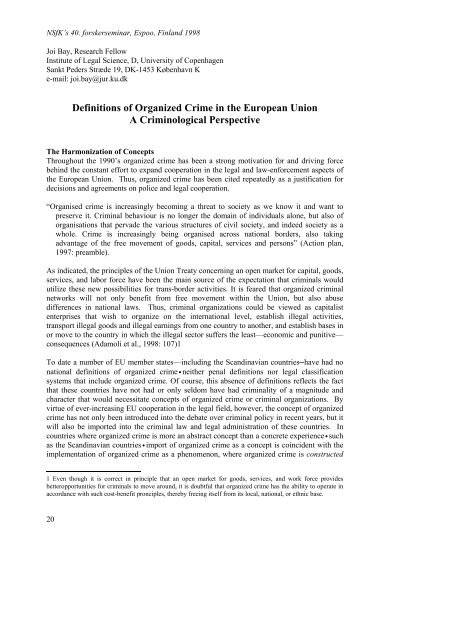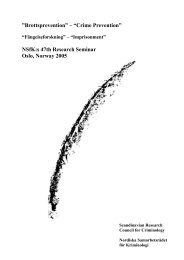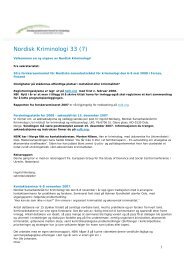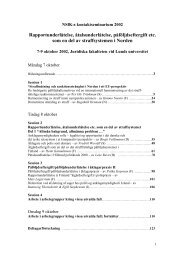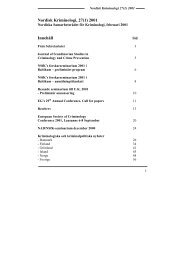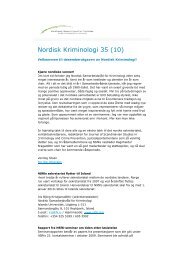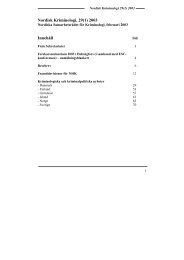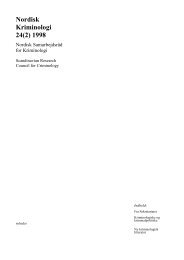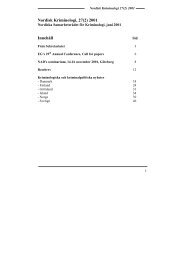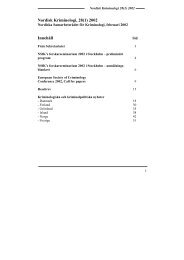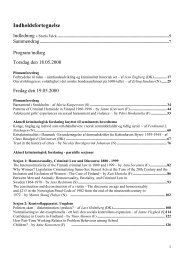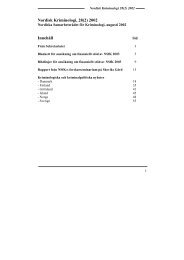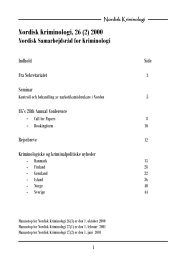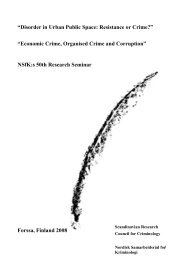Organised Crime & Crime Prevention - what works? - Scandinavian ...
Organised Crime & Crime Prevention - what works? - Scandinavian ...
Organised Crime & Crime Prevention - what works? - Scandinavian ...
You also want an ePaper? Increase the reach of your titles
YUMPU automatically turns print PDFs into web optimized ePapers that Google loves.
NSfK’s 40. forskerseminar, Espoo, Finland 1998<br />
Joi Bay, Research Fellow<br />
Institute of Legal Science, D, University of Copenhagen<br />
Sankt Peders Stræde 19, DK-1453 København K<br />
e-mail: joi.bay@jur.ku.dk<br />
20<br />
Definitions of Organized <strong>Crime</strong> in the European Union<br />
A Criminological Perspective<br />
The Harmonization of Concepts<br />
Throughout the 1990’s organized crime has been a strong motivation for and driving force<br />
behind the constant effort to expand cooperation in the legal and law-enforcement aspects of<br />
the European Union. Thus, organized crime has been cited repeatedly as a justification for<br />
decisions and agreements on police and legal cooperation.<br />
“<strong>Organised</strong> crime is increasingly becoming a threat to society as we know it and want to<br />
preserve it. Criminal behaviour is no longer the domain of individuals alone, but also of<br />
organisations that pervade the various structures of civil society, and indeed society as a<br />
whole. <strong>Crime</strong> is increasingly being organised across national borders, also taking<br />
advantage of the free movement of goods, capital, services and persons” (Action plan,<br />
1997: preamble).<br />
As indicated, the principles of the Union Treaty concerning an open market for capital, goods,<br />
services, and labor force have been the main source of the expectation that criminals would<br />
utilize these new possibilities for trans-border activities. It is feared that organized criminal<br />
net<strong>works</strong> will not only benefit from free movement within the Union, but also abuse<br />
differences in national laws. Thus, criminal organizations could be viewed as capitalist<br />
enterprises that wish to organize on the international level, establish illegal activities,<br />
transport illegal goods and illegal earnings from one country to another, and establish bases in<br />
or move to the country in which the illegal sector suffers the least—economic and punitive—<br />
consequences (Adamoli et al., 1998: 107)1<br />
To date a number of EU member states—including the <strong>Scandinavian</strong> countries─have had no<br />
national definitions of organized crime•neither penal definitions nor legal classification<br />
systems that include organized crime. Of course, this absence of definitions reflects the fact<br />
that these countries have not had or only seldom have had criminality of a magnitude and<br />
character that would necessitate concepts of organized crime or criminal organizations. By<br />
virtue of ever-increasing EU cooperation in the legal field, however, the concept of organized<br />
crime has not only been introduced into the debate over criminal policy in recent years, but it<br />
will also be imported into the criminal law and legal administration of these countries. In<br />
countries where organized crime is more an abstract concept than a concrete experience•such<br />
as the <strong>Scandinavian</strong> countries•import of organized crime as a concept is coincident with the<br />
implementation of organized crime as a phenomenon, where organized crime is constructed<br />
1 Even though it is correct in principle that an open market for goods, services, and work force provides<br />
betteropportunities for criminals to move around, it is doubtful that organized crime has the ability to operate in<br />
accordance with such cost-benefit pronciples, thereby freeing itself from its local, national, or ethnic base.


